At Home in Mitford Read online
Page 4
“There!” said Emma, plunking a box of Little Debbies on his desk. “You weren’t the one who gave these up for Lent. You can have my supply.” She wondered what he did give up for Lent, anyway, but didn’t think it was proper to ask.
He put the box in his top right desk drawer, “You,” he said with feeling, “are a pearl above price.”
"What happened?”
“It was a landmark day. Petrey Bostick called to say we ought to use part of the money to put air-conditioning in the church.”
Emma rolled her eyes. That old business. What was the point of living at an elevation of 5,000 feet if you had to install air-conditioning? Every year, people got lathered up about air-conditioning.
In the course of the morning, a real estate agent called to suggest they buy the property on either side of the churchyard, which would quietly be made available, if they were interested. The rector was not surprised that the price had gone up fifty percent since the vestry made an inquiry just two years ago.
The newspaper called to ask if they could photograph the painting with Miss Sadie standing on one side and Father Tim on the other. The appraiser called and said he’d be there Monday at 9:30. And, they heard that the vestry had scheduled a meeting to discuss the purchase of a steel columbarium painted to look like walnut, brass collection plates instead of the traditional Lord’s Chapel baskets, and a floor-to-ceiling stained-glass window for the narthex.
After two parishioners called to remind him of the hungry around the world, another dropped by to remind him of the hungry here at home.
During a lull, he turned to Emma and said simply, “We must not let this destroy the joy of Easter.”
“Amen,” she said with conviction.
There was only one problem. He couldn’t figure out how to prevent that from happening.
A Canadian cold front was sending streams of icy air along the ridges and into the coves surrounding Mitford.
After walking Barnabas through Baxter Park, attending to his hospital rounds, and counseling a parishioner over breakfast at the Grill, he was profoundly ready for a peaceful time at his desk. Now he needed to catch up the loose strings of the two approaching Easter services. Perhaps he could do this, he thought, after the appraiser’s visit at nine-thirty. If he had any lingering anxiety about the outcome of the painting’s appraisal, he was blessedly unaware of it.
He saw Winnie Ivey sweeping the sidewalk in front of her Sweet Stuff Bakery, as she did each and every morning. It was one of the sights he liked most to see: someone putting their affairs in order.
“Good morning, Winnie!”
Winnie was bundled warmly. He could see only plump cheeks and bright eyes above her scarf. “Father, I’m glad to catch you! I saved yesterday’s napoleons just for you!”
Hoppy had recently warned him, “Stay away from that stuff, pal. Carry raisins in your pocket.” Raisins, indeed. Worse yet, he’d recently overheard someone refer to him as “that portly priest at Lord’s Chapel.”
“Winnie,” he said, following her inside and taking a deep breath of the cinnamon-scented air, “Hoppy tells me I’ve got to go easy on sweets.”
“He’s been telling me that for years, and I sure do wish I could mind him,” she said affably, removing three napoleons from the case.
“Maybe you could give those to Miss Rose and Uncle Billy when they come in.”
“Oh, don’t you worry about that! They get yesterday’s oatmeal cookies. Good fiber, you know.”
He wondered why he felt helpless as she handed him the paper bag and patted his arm.
In case Hoppy should drive by on his way to the hospital, he carefully stuffed the bag into his coat pocket. He would not eat one bite, he told himself, not even one. They would go immediately to Emma, who could make her own peace with the seductive charm of Winnie Ivey’s napoleons.
As he came within sight of his office, he was startled to see a small group waiting at the door. It appeared to be Harry Nelson, Bud Simmons, and Maude Beatty. Also, two cars were parked at the sidewalk, with their motors running.
He felt a reckless desire to step behind a laurel bush and eat the entire contents of the bag in his pocket.
He was relieved that he’d left Barnabas sleeping in the garage, for the crowd had literally packed the office. He opened the bathroom door, which made room for two, shoved the communal wastebasket under his desk, which made room for another, and let the rest of the group shift for itself.
“Father,” Harry said sheepishly, “I know you didn’t expect such a big whang-do here this mornin’, but we thought the vestry ought to see what this appraiser fellow has to say.”
“As you can see, Harry, there’s no room left for the appraiser to get in here and say anything.”
Harry laughed weakly and stood closer to the wall.
The rector turned on the electric heater, then went about his coffee making. “With patience, forbearing one another in love,” he reminded himself. Funny how his morning readings often went out to greet the circumstances of the day.
In a few minutes, the smell of coffee filled the little room and began to warm the hearts of the entire assembly. But since the pot only made four cups, and there were seven people, he proceeded cautiously with the pouring.
Emma opened the front door with a glower and squeezed inside. She did not like cold spring mornings, dimly feeling they were some sort of betrayal.
“Oh, for God’s sake!” she said, seeing that Maude Beatty was sitting in her chair like she owned it.
The appraiser arrived at nine-thirty sharp, removed his coat, handed it to Harry Nelson, and went straight to work.
He hummed vaguely to himself and clicked his teeth. No one spoke.
“Hmmmm,” he said occasionally.
He took out a magnifying glass and went over every inch of the canvas, which he had propped against a stack of books on the rector’s desk.
Then he opened a small black box and removed a pair of pliers and a hammer. “Looking for a signature,” he informed the fascinated onlookers.
In a moment, the frame was off, and the appraiser was holding the canvas up to the natural light. “Hmm,” he said.
Father Tim thought it a wonderful thing that a man could say only “Hmm,” and gain the fixed attention of an entire roomful of people. Even his pithiest sermons failed to accomplish this.
“Use your bathroom?” asked the appraiser. The two vestry members moved out of the minuscule room, which was scarcely the size of a cupboard, and flattened themselves against Harry Nelson.
The appraiser took the canvas under one arm and went in, searching the walls and baseboards. “Got an outlet in here?”
“You’ll have to unplug the heater,” said Emma, testily. Why in God’s name was Bud Simmons sitting on the recipes she’d torn out of Southern Livingand put on her desk, was he blind?
The appraiser shut the bathroom door, and everyone looked around with faint smiles.
If there was anything Harry Nelson didn’t like, it was a nervous silence. “Did you hear the one about the funeral procession?” he wanted to know.
Oh my aching back, thought Emma.
“Well, this funeral procession was goin’ up the hill to the church and the back door of the hearse flew open and out shoots the casket and, blametty blam, down the hill it goes through the intersection with horns blowin’ and people dodgin’ out of the way, and it runs on down the street and jumps up on the sidewalk and busts in through the pharmacy door and shoots down the aisle to the druggist and the lid pops up and this guy sits up and says: ‘Got anything to stop this coffin?’ ”
I wouldn’t laugh if my life depended on it, Emma thought, as the appraiser came out of the bathroom.
“This may be a Vermeer,” he said drily. A little gasp went up.
“And then again, it may not. I feel reasonably confident that it could have been painted during the mid- to late seventeenth century, by any one of a dozen people working under Vermeer’s influence.
>
“There is no signature that I can find and no evidence of restoration. I recommend that the canvas be shipped at once to New York, to a team of experts who can research the matter fully and apply more scholarship than I am able to provide.”
The appraiser had finished his report. In fact, he didn’t even wait for a response from the astonished gathering, but began to repack his toolbox and wind up the cord of his black light.
A murmur ran through the group. Bud Simmons got up, scattering recipes to the floor, and spoke in a low voice to Harry Nelson. The others waited.
“We think it ought to be sent to New York,” Harry said, considerably louder than was necessary in the small room.
“Agreed!” said Lester Shumaker, looking around for support.
The appraiser produced a sheaf of papers and had Harry Nelson sign every one. Then, he put on his coat and muffler, wrapped the painting in bubble plastic, slipped it into a large sack, picked up his toolbox, bowed briefly from the waist, and was gone.
In a few minutes, so were the others.
“Emma,” said the rector, with a trace of weariness, “let’s have another pot of coffee.”
“Great!” said Emma, who, on those rare occasions when he wanted a second pot, considered it a small celebration.
He looked at the visitor’s bench. There, propped against the wall just under the coat pegs, was the empty frame.
He squeezed by Emma, who was measuring out the Maxwell House, and took the frame into the bathroom. It fit perfectly behind the shower stall.
“There!” he said with satisfaction. “Out of sight, out of mind.”
At eleven o’clock, he had a welcome phone call. “Tim, Hal here. I heard what’s going on with the painting, and in case you’re feeling sick and tired of the whole thing, I’d like to give you a prescription.”
He didn’t know how he felt about receiving medical care from a vet.
“Here it is: Be ready at eight o’clock in the morning, and I’ll pick you and Barnabas up in the truck. We’ll spend the day at Meadowgate, chasing rabbits and looking for woodchucks. For supper, Marge’ll make a big chicken pie, and I’ll bring you back in time to get your beauty sleep for church on Sunday.”
If he had gotten a call to say he’d won the lottery, he couldn’t have been happier. Thank heaven he’d worked all week on his sermon, thereby giving him the freedom of an entire Saturday.
He drank two full mugs of coffee, which was unusual, with cream, which was even more unusual, and, according to Emma, spent the rest of the morning “chattering like a magpie.”
Meadowgate Farm was situated in one of the most beautiful valleys around Mitford. Just ten miles from the village, the land began to roll steeply, looking like the pictures he had seen of Scotland.
A flock of sheep grazed in one green pasture, across the fence from a herd of contented Guernseys. The white blossoms of wild bloodwort gleamed along the roadsides, and here and there the bank of an old farmplace was massed with creeping pink phlox.
You leadeth me beside still waters! he thought happily. You restoreth my soul!
It was a glorious morning, drenched with birdsong, and as they turned into the drive, a horde of farm dogs came bounding toward the red truck. There was Buckwheat, an English foxhound. Bowser, a chow. Baudelaire, a soulful dachshund. Bodacious, a Welsh corgi. And Bonemeal, a mixed-breed foundling who, as a puppy, had dug up the new tulip bulbs in order to eat the fertilizer.
The rector opened his door cautiously, and Barnabas dived into the barking throng. Was it possible his hearing could be permanently impaired? “Let ’em get acquainted,” Hal said.
At the back door, Marge gave Father Tim a vigorous hug, which he returned with feeling.
“Tim! You’ve got your annual planting tan!”
“And you’ve got your perennial joi de vivre!”
In the center of the kitchen was a large pine table, bleached by age, with benches on either side. A Mason jar of early wildflowers sat in the center, along with a deep-dish apple pie, fresh from the oven. A dazzling beam of light fell through the windows that looked out to the stables.
Their guest stood transfixed. “A foretaste of heaven!” he said, feeling an instant freshness of spirit.
“Sit,” said Marge, whose blonde hair was captured in a bandanna the color of her dress. “We’ll start with freshly ground coffee and cinnamon stickies. Then, I’ve packed lunches, because I hear you guys are going tromping in the woods.”
" ’Til we drop,” promised Hal, lighting his pipe. “Tim has some heavy-duty stress to contend with. Holy Week, two Easter services, a Vermeer, a new dog the size of a Buick, fourteen azaleas to get in the ground, and,” he looked at Father Tim, “there must be something else.”
“A bone spur in my left heel,” he said, cheerfully.
At two-thirty, Marge rang the farm bell, and the men came at a trot across the early spring field with Barnabas, Bowser, and Buckwheat dashing ahead. The bell rang only for an emergency.
“Trissie Steven’s pony. Caught in a barbed wire fence. Bleeding badly,” Marge said in the telegraphic way she had of communicating urgent news to her husband.
“Want to come or stay, Tim? Your call.”
“Oh, stay!” said Marge. “We haven’t had a good visit in a hundred years. Besides, you’ve been talking man talk all day. Let’s talk peonies and rosebushes, for heaven’s sake.”
His breathing was ragged from the trot across the field. “Well,” he said, lamely, thinking of downing a glass of Marge’s sweetened iced tea.
“I’m off,” Hal said, kissing his wife on the cheek.
Marge cleared the remains of the pastry she’d rolled out for the pie, while the chicken simmered on the stove. “Sit down and talk to me while I finish up. The tea’s in the pitcher, and fresh peppermint. A few shoots are already out; that tall grass by the garden shed kept it protected over the winter.”
He poured the tea, got ice from the refrigerator, and sat down in the rocking chair that had belonged to Marge’s father.
It was balm to his soul to sit in this beamed, high-ceilinged room, with its wonderful smells and golden, heart-of-pine floors. At Meadowgate Farm, he mused, nothing terribly dramatic ever seemed to happen. Life appeared to flow along sweetly, without many surprises or obstacles to overcome.
Marge sat down on the window seat and tucked her hair into the bandanna. He thought she looked unusually bright, radiant.
“Did Hal tell you?”
“Tell me? Tell me what?”
Perhaps their Annie was getting engaged, he thought. Or maybe Hal had finally come across with their much-discussed vacation in France, to celebrate her fiftieth birthday.
“I’m pregnant,” she said simply, wiping her hands on her apron.
After dinner, which the rector pronounced “the finest yet,” the men washed the dishes. Then they all gathered before a small fire on the kitchen hearth.
Hal and Marge sat on the slouchy, chintz-covered sofa, which the dogs usually favored, and held hands like sweethearts. Bowser and Baudelaire slept peacefully by the fire, and Barnabas slept with his head on his master’s feet.
The rector lifted a glass of Hal’s oldest port.
“To Marge, the bravest of the brave! May you be blessed with a child who is full of grace and merriment, and endowed with the countenance of its lovely mother.”
“Thanks, but I’m not brave, at all. I’m scared silly. I keep thinking Hoppy will call and say, ‘Ha, ha, just kidding. You can go back to your real life, now.’”
Barnabas gave a little dream bark.
“Chasing squirrels,” said Hal. “You know, I think you’ve got yourself a fine dog, there. His character appears to reveal the wolfhound in him. There’s an old story that says a wolfhound can tell by looking on a man’s face whether his intentions are good or evil.”
“A trait devoutly to be desired by the rest of us,” said the rector, with a new pride in his companion.
“Read to us, Timo
thy. You’ll have to be leaving in an hour or so, and you know how I covet a read before you go.” Marge fluffed up the pillow behind her and leaned cozily against her husband’s shoulder.
She had put several books on the table next to his chair. “First come, first served,” he said cheerfully, and opened a volume at random.
“ ‘Up! up! my Friend, and quit your books,’ ” he read from Wordsworth, “ ‘Or surely you’ll grow double: Up! up! my Friend, and clear your looks; Why all this toil and trouble?’ ”
The sun, above the mountain’s head,
A freshening lustre mellow
through all the long green fields has spread
His first sweet evening yellow.
Books! ’tis a dull and endless strife:
Come, hear the woodland linnet
How sweet his music! on my life,
there’s more of wisdom in it.
As Father Tim read, Barnabas awoke, yawned, and began to listen with rapt attention.
Sweet is the lore which Nature brings
our meddling intellect/mis-shapes the
beauteous forms of things
we murder to dissect.
Enough of Science and of Art
Close up those barren leaves
come forth, and bring with you a heart
That watches and receives.
Barnabas sighed with what appeared to be satisfaction, and gazed at the reader as if waiting for more.
“Remarkable dog,” said Hal.
CHAPTER THREE
New Possibilities
Much to his relief, little mention of the painting came to his ears during Holy Week.
Palm Sunday had been a blessing to the congregation, and on Maundy Thursday, he had truly experienced a deep and enriching mournfulness. On Good Friday he fasted, and on Holy Saturday felt much the better for it in every way.
Easter morning dawned bright and clear. “Dazzling to the senses!” said one parishioner. The beautiful old church was full for both services, and the tremor of joy that one always hoped for on this high day was decidedly there.

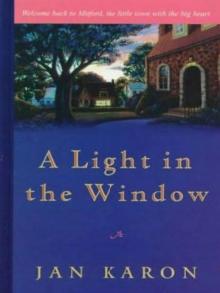 A Light in the Window
A Light in the Window Somewhere Safe With Somebody Good
Somewhere Safe With Somebody Good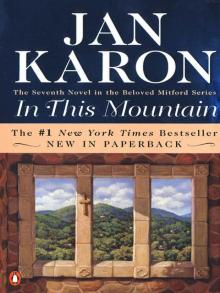 In This Mountain
In This Mountain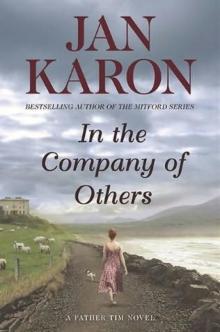 In the Company of Others
In the Company of Others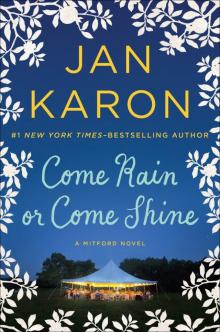 Come Rain or Come Shine
Come Rain or Come Shine To Be Where You Are
To Be Where You Are These High, Green Hills
These High, Green Hills Light From Heaven
Light From Heaven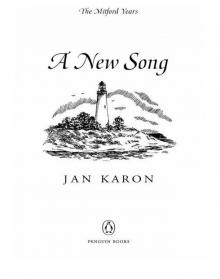 A New Song
A New Song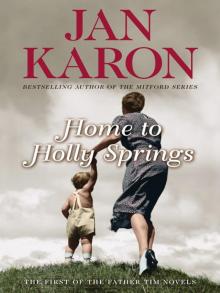 Home to Holly Springs
Home to Holly Springs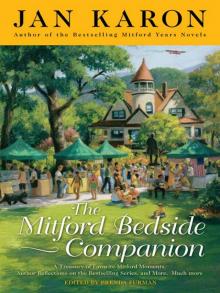 The Mitford Bedside Companion
The Mitford Bedside Companion At Home in Mitford
At Home in Mitford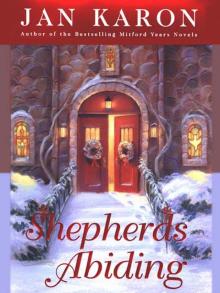 Shepherds Abiding
Shepherds Abiding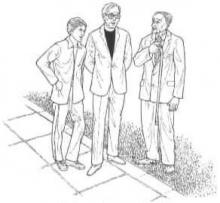 Out to Canaan
Out to Canaan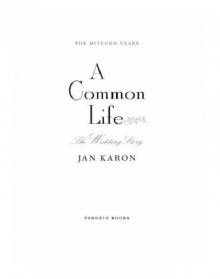 A Common Life: The Wedding Story
A Common Life: The Wedding Story Jan Karon's Mitford Years
Jan Karon's Mitford Years